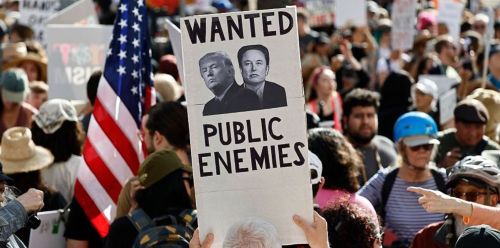

If truth becomes a performance, and loyalty a test to be passed rather than a principle to be held, then democracy itself becomes a stage, one where the audience is no longer allowed to speak.

By Matthew A. McIntosh
Public Historian
Brewminate
A Strange New Test of Faith
Donald Trump has never been one to shy away from theatrical politics. Loyalty, in his orbit, is not merely expected; it is demanded, performed, and policed. But in the spring of 2025, the demand took a peculiar turn. Reports began surfacing from within campaign circles that loyalty oaths alone were no longer sufficient. Staff, surrogates, and potential appointees were being subjected to what insiders quietly referred to as a “lie detector test”, not just for truthfulness in a conventional sense, but for allegiance.
The idea sounds like satire. It is not.
These so-called screenings rely on polygraph-like devices promoted by a fringe group of tech entrepreneurs and former intelligence officers. Trump allies describe them as cutting-edge tools for rooting out disloyalty and betrayal before it metastasizes. In practice, the machines measure physiological signals (blood pressure, pulse, skin conductance) and interpret deviations as signs of deception.
The results are then passed along to senior campaign officials who use them, according to multiple reports, to make personnel decisions. Whether someone believes Trump actually won the 2020 election. Whether they would comply with controversial orders. Whether they speak to the media. These are not traditional security questions. They are ideological filters.
A Science Built on Sand
The polygraph has long held a curious place in American culture. In television and film, it is portrayed as a magical truth machine, capable of seeing into the soul. In reality, it is far less reliable. The National Academy of Sciences concluded in 2003 that polygraph testing was “intrinsically susceptible to producing erroneous results.” Since then, little has changed.
While the devices do measure bodily responses with some accuracy, the interpretation of those responses is highly subjective. Stress does not equal deception. Nervousness is not dishonesty. False positives are common. False negatives, especially among individuals trained to regulate their physiological reactions, are also frequent.
Yet polygraph results still carry weight in some federal agencies, including parts of the intelligence community. The Trump campaign is now attempting to extend that logic into the political realm. But where government polygraphs are, at least in theory, focused on national security, these loyalty tests appear aimed at ideological conformity.
That shift is profound. It transforms a flawed but narrowly applied tool into a broader mechanism for enforcing belief.
Loyalty as Currency

Loyalty has always been central to Trump’s political identity. It defines his language, shapes his alliances, and sets the boundaries of his trust. But since returning to the White House, he has taken that ethos to new extremes.
The 2025 administration is one marked by purges and filters. Several high-profile appointments have been rescinded at the last minute after candidates were deemed “unreliable.” Aides once close to Trump have found themselves cut off for the smallest perceived deviations. Even campaign volunteers have reported unusual screening questions during interviews.
The new “lie detector” effort is not just about weeding out potential leakers or dissenters. It is about cultivating an inner circle that is not merely loyal, but proven to be so through ritualized testing. This echoes less the politics of a republic than the logic of a palace, where access and proximity depend not on merit, but on performance and surveillance.
In this world, belief is not an internal conviction. It is a behavior to be verified.
The Technology behind the Curtain
Much of the technology being used is not actually new. It is a rebranding of polygraph systems long viewed with skepticism by scientists and courts alike. Some systems have been updated with AI overlays or new sensors, marketed under names like “neuro-integrity mapping” or “truth alignment scanning.” These labels give a veneer of innovation, but the core remains unchanged.
One of the systems reportedly used by the Trump campaign was developed by a company that previously tried to market its devices to airports and foreign governments. Independent audits found little correlation between the system’s results and actual truthfulness. In one test, it labeled over 30 percent of honest respondents as deceptive.
Despite this, such tools continue to find buyers, particularly among those more concerned with control than accuracy.
The Problem of Consent

Legal scholars have raised alarms about what this practice might mean, particularly if extended into government hiring or civil service roles. Coerced participation, even under the guise of “voluntary screening,” may violate constitutional protections.
There is also the ethical problem of informed consent. Most subjects do not understand the scientific limitations of polygraphs. Many believe, wrongly, that a nervous twitch or elevated heartbeat will brand them as liars. That belief alone can influence results, creating a self-fulfilling prophecy of guilt.
The fear of failing the test, even if one has done nothing wrong, exerts its own kind of pressure. It creates a climate of suspicion and self-censorship. In such a climate, people become less likely to express disagreement or raise concerns. They watch their words. They second-guess their loyalties.
That is precisely the point.
Echoes of the Past
The use of pseudoscientific tools to measure inner belief has an unsettling history. During the Cold War, both the United States and the Soviet Union experimented with various forms of psychological profiling, hoping to detect ideological subversion. The results were unreliable, the methods invasive, and the outcomes often tragic.
In more authoritarian contexts, loyalty tests have been used to entrench power and eliminate dissent. From Maoist China to Saddam Hussein’s Iraq, regimes have employed everything from informant networks to forced confessions to ensure compliance. What distinguishes those regimes from a functioning democracy is not the presence of fear, but its institutionalization.
America has long prided itself on resisting such tendencies. The Constitution does not demand fealty to a person. It protects dissent. It allows for disobedience, even whistleblowing, as a form of civic duty.
Trump’s loyalty campaign, with its reliance on sham science, asks something different. It asks for obedience dressed as truth.
Where This Leads
The danger is not just that these tests are scientifically invalid. It is that they reframe loyalty as something to be extracted, rather than earned.
Politics, at its best, is a messy negotiation of competing interests and ideas. It thrives on disagreement. But in a system where loyalty is quantified and dissent punished, politics becomes hollow. What remains is spectacle and compliance.
Even if the tests are eventually abandoned, the logic they represent may linger. Other campaigns may imitate them. Other leaders may find value in their performative certainty. And a generation of public servants, taught to fear the consequences of independent thought, may choose silence over honesty.
That is not the future of a free republic. It is the architecture of something else entirely.
If truth becomes a performance, and loyalty a test to be passed rather than a principle to be held, then democracy itself becomes a stage, one where the audience is no longer allowed to speak.
Originally published by Brewminate, 07.22.205, under the terms of a Creative Commons Attribution-NonCommercial-NoDerivatives 4.0 International license.


